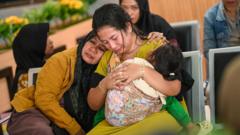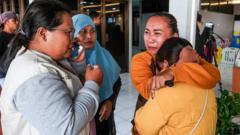Indonesia's government is launching a nationwide free school lunch program as it confronts growing unemployment, which is projected to reach 5% this year. Critics argue that the president's focus on welfare projects is misplaced amidst economic decline.
Indonesia's Free Lunch Initiative Faces Economic Scrutiny

Indonesia's Free Lunch Initiative Faces Economic Scrutiny
As Indonesia rolls out a free lunch program for students, rising unemployment raises concerns about the government's economic priorities.
In the bustling city of Cimahi, Indonesia, students are receiving lunches funded by a government initiative aimed at nourishing the nation's future. However, as President Prabowo Subianto champions this free meal program, experts suggest that the economy is experiencing deeper troubles than the administration acknowledges.
Nina Megayanti, once thriving in Jakarta, faced a harsh reality when she lost her marketing job last year amid a slowing economy. Her situation is not unique, as millions of Indonesians grapple with rising unemployment—a troubling trend warned by the International Monetary Fund (IMF) which forecasts that Indonesia's unemployment rate could become the second-highest in Asia, trailing only China.
While the government touts a steady annual growth rate of around 5%, critics like Awalil Rizky, an economist with the Bright Institute, argue that the optimistic narrative does not reflect the struggles faced by the jobless. Rizky highlights the stark employment figures as a clear indication that economic conditions are faltering.
To fund the ambitious school lunch initiative and other proposed projects like affordable housing and a sovereign wealth fund, President Subianto has made significant budget cuts and enforced austerity across various ministries. However, cutting government spending may exacerbate the already fragile economic landscape, as Indonesia's economy is heavily reliant on state expenditures.
Despite these concerns, the government recently revised its economic growth projection for 2025, lowering it to approximately 5%, down from a previous 5.2% estimate. As the situation unfolds, the interplay between social programs and economic health will be crucial for Indonesia's future, leaving many to ponder whether free lunches are the right path in tough times.




















